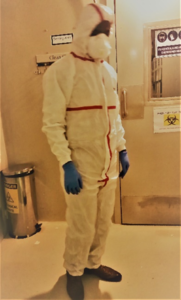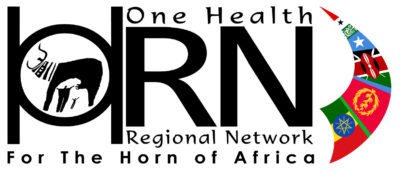 The call by the One Health Regional Network for the Horn of Africa (HORN) project in April 2020, to individuals and teams with research ideas that considered One Health approaches to addressing the ongoing COVID-19 pandemic, provided an excellent opportunity for a Kenyan team that was keen to contribute towards this initiative.
The call by the One Health Regional Network for the Horn of Africa (HORN) project in April 2020, to individuals and teams with research ideas that considered One Health approaches to addressing the ongoing COVID-19 pandemic, provided an excellent opportunity for a Kenyan team that was keen to contribute towards this initiative.
Having observed that sampling procedures to obtain nasal swabs and /or respiratory secretions for the detection of the SARS-CoV-2 virus are relatively invasive and population responses towards wearing of facemasks differed among individuals, the team appreciated that these could influence COVID-19 prevention efforts and impact outcomes of the pandemic.
This multidisciplinary team, comprising of Lorren Alumasa, Mariah Ngutu, Reuben Mwangi and Stephen Leshan who are young, upcoming researchers in Public health epidemiology, Anthropology, Molecular biology and Field epidemiology respectively, with the support of experts known to them in these areas of research, had been brainstorming on ideas of investigating and providing evidence that could inform mass COVID-19 testing practicability in the community as well as gain insights into individual behaviours around facemasks use. Interested in refining the idea and developing a high-quality research proposal, the HORN COVID-19 Sandpit call came in handy as it provided an excellent opportunity for just that. We considered this call, and with advice and mentorship from the local experts, proceeded to make the application.
We received feedback from HORN that our application was successful and that we had been invited to the first ever virtual Sandpit event between June 1 – 5, 2020. At first, we wondered how possible this would be especially since engagements with other attendees as well as participatory opportunities (that would be fewer) were required for a successful outcome. The Zoom chats, slack, share features and breakout room discussions made the event as successful as any face to face event!
At the sandpit, with the support of expert mentors allocated to us and considering knowledge gained from presentations during the event, we developed a collaboration with the mentors from relevant disciplines and networked within the 5 days to develop a One health research proposal that would have an impact on responding to the ongoing COVID-19 pandemic in Kenya and the region.
The research Study
Following rigorous and successful development, refining and presenting of the initial research idea through collaborative work with the multidisciplinary team at the Sandpit event, the proposal was funded!
This success could not have been possible without the Sandpit mentors’ inputs. Prof. Nicola Williams (University of Liverpool), Prof. Jude Robinson (University of Glasgow) and Prof. Andy Morse (University of Liverpool) impacted a great deal of knowledge to team members at the sandpit that saw them develop a workable proposal that would be pitched to the funding panel and eventually get funded.
 The study titled ‘Analysis of SARS-C0V-2 virus in exhaled breath and mass-masking behaviour in a Kenyan Community’ aims to explore the knowledge and attitudes that influence mass masking behaviors and practices in Nairobi, Kenya, and to analyze presence of SARS-CoV-2 virus in masks and determine the potential utility of facemasks as a diagnostic tool for non-invasive surveillance of COVID-19.
The study titled ‘Analysis of SARS-C0V-2 virus in exhaled breath and mass-masking behaviour in a Kenyan Community’ aims to explore the knowledge and attitudes that influence mass masking behaviors and practices in Nairobi, Kenya, and to analyze presence of SARS-CoV-2 virus in masks and determine the potential utility of facemasks as a diagnostic tool for non-invasive surveillance of COVID-19.
An exploratory community-based study anchored on biological and anthropological perspectives to enable quantitative and qualitative data to address the research objectives will be conducted.
Post Sandpit
The team, now known as the ‘Masks study team’ continued collaborating with the Sandpit mentors on the next steps of project development and implementation, updating them on the progress made. We also continually worked with the local mentors who are also knowledgeable of and have been instrumental in the research proposal development process but more specifically, experienced in processes involved in the implementation of research studies within the local setup. Dr. Katie Hamilton (University of Liverpool), Dr. Lillian Wambua (ILRI), Dr. Dishon Muloi (ILRI), Dr. Salome Bukachi (University of Nairobi) and Prof. Eric Fevre (University of Liverpool/ILRI) experts in epidemiological, molecular biology and anthropological research have also impacted a great deal of knowledge and skills to the team on matters research planning and implementation in the local setup. Local ethics application processes, other relevant authorizations, consumable procurement processes, data collection steps and many more.
Where we are at?

We have received all relevant approvals and authorizations and are at the pilot study phase to determine presence of SARS-CoV-2 virus on masks and optimize laboratory protocols for detection of SARS-CoV-2 virus from masks of infected individuals. We intend to complete this before the Christmas break. Implementation of the community study aspect will be undertaken at the beginning of the new year, 2021.
Some Challenges
The ongoing COVID-19 pandemic slowed down the approval and authorization processes with major concerns of potential risk of exposure to the pandemic amongst researchers. Researchers will ensure appropriate use of PPE and application of other preventive measures such as proper hand hygiene and social distancing. Routine COVID-19 tests will be undertaken by the team and regular progress reports to mentors during research activities will be undertaken.
Appreciation
The masks study team would like to give their special thanks to the One Health HORN project for the opportunity to participate in the Sandpit event, for sharing knowledge and skills in One Health Research at the event and for funding the study proposal. The team appreciates that a One Health approach to research is critical to optimally understand a research problem and comprehensively inform measures to address the same not only for the COVID-19 pandemic but also other pandemics and / or epidemics.
Our sincere gratitude goes to the Sandpit mentors and all other presenters at the Sandpit event for their dedicated support throughout the proposal development to the pitching process, and their continued support and mentorship post sandpit.
We thank the local mentors too for their encouragement to apply for the Sandpit event and their support through all the research processes involved now and as we move on..

